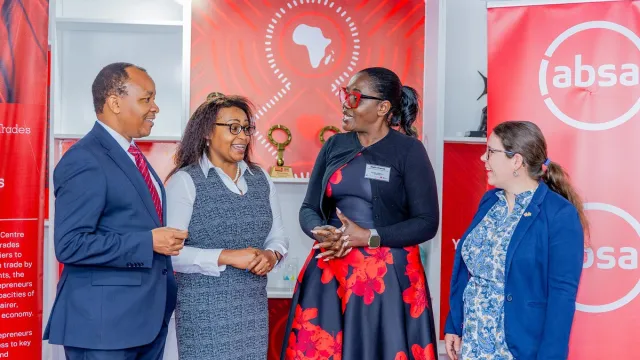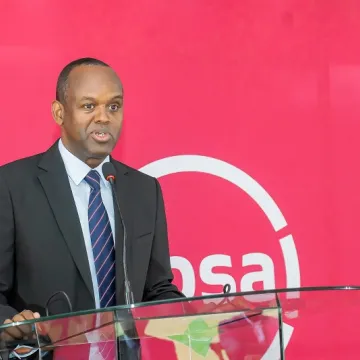Absa Kenya is banking on women financing to realise SDGs as deadline beckons

Absa Bank Kenya Head of SME Erastus Muthura, International Trade Centre SheTrades Hubs in Eastern and Southern Africa Senior Advisor Phyllis Mwangi, Brogibro Safaris and Events CEO Ruth Owino and British High Commission Agriculture, Food and Drink Attaché for Africa Rebecca Schneider during the Access to Finance Accelerator training for women in export launch at the Absa Bank Kenya Headquarters in Nairobi early this year.
Women-led businesses still face an uphill battle to secure funding, a barrier that has continued to stall progress and innovation.
This is despite various studies indicating that Women-owned businesses that secure funding deliver better returns on investment (ROI) and tend to be in business longer than their male counterparts.
A survey released late last year by the Audit firm Ernst & Young (EY) revealed that 61 per cent of women entrepreneurs use a personal credit card to fund their business. A glaring gap in funding, according to the report, means that only one in four women can access a business loan compared to three out of four for men.
This disparity has resulted in a $42 billion financing gap for African women across business value chains, including $15.6 billion in agriculture alone. Generally, funding to women is seen as riskier, hence comes with prohibitive interest rates. In addition, women often lack traditional collateral and guarantees like land, according to EY.
According to Absa Kenya, most financial institutions struggle to understand and serve women entrepreneurs, while many women, in turn, lack the financial know-how to meet the demands of these institutions.
Yet, funding to this segment has multiple socio-economic dividends for beyond profit and is powerful lever for realising global Sustainable Development Goals (SDGs). This is according to the United Nations(UN).
The UN notes that women’s increased income, consumption and investment in education, health and other services would contribute to poverty reduction as well as sustained and inclusive economic growth in the region.
"Women typically reinvest up to 90 per cent of their income in the education, health and nutrition of their family and community, compared to up to 40 per cent for men. This means that investing in women’s businesses can transform societies," a UN report unveiled in February reads in part.
Absa Kenya is alive to this fact has accelerated funding for women-led business within the past five years.
Last week, it rolled out an ambitious goal to diversify its supply chain by 30 per cent by the end of 2025, with a specific focus on empowering women, individuals with disabilities, and youth-led businesses throughout Africa.
This is after the lender managed to push the rate of women-owned businesses within its supply chain to 18 per cent, three folds since 2021.
This achievement has led to the lender receiving special recognition from the International Finance Corporation (IFC) as part of the Sourcing2Equal Kenya, a programme that acknowledges efforts in promoting inclusive sourcing practices.
In 2025, Absa Kenya has committed to dedicate a significant share of Sh100 billion SME financing to women -led businesses in line with its target to impact over 1 million women entrepreneurs with a new proposition that offers financial and non-financial solutions designed to accelerate business growth.
Rolled out in 2021, the Absa She Business Account targets women in business, particularly those in the Small and Medium Enterprises (SME) segment. The support involves funding, access to the market, access to information as well as mentorship and coaching.
This is in addition to a commitment to advance Sh10 billion to women-owned small and medium enterprises over the next five years.
The money is availed to women entrepreneurs through the existing banking products including unsecured and secured loans, trade finance, asset finance, property finance and working capital facilities.
According to the bank, women form over 50 per cent of the local and global population and account for a significant percentage of the SME sector.
"However, their participation in the national economic development is often stifled by limited access to financial resources and social-cultural restrictions. We are confident that this proposition will go a long way in boosting their growth."
During the 2024 investor briefing, where it announced a net profit of Sh20.9 billion and an operating profit of Sh29.7 billion, the bank revealed that Sh9.6 billion of its Sh10 billion fund had already been disbursed, with 30 per cent directed to women-led businesses.
Additionally, the bank announced Wezesha Express, an initiative aimed at accelerating loan processing times. With this proposition, Absa committed to processing SME loans of up to Sh3 million within just 48 hours, from application to disbursement
When he stood up to speak, Absa Bank Kenya Managing Director and CEO, Abdi Mohamed said that supporting SMEs and businesses remained a priority, with increased access to financing, market opportunities, mentorship, and digital solutions.
"As part of these efforts, the Bank empowered over 35,000 small enterprises and women-led businesses with essential financial and non-financial skills to help them navigate the challenging landscape," he said.





